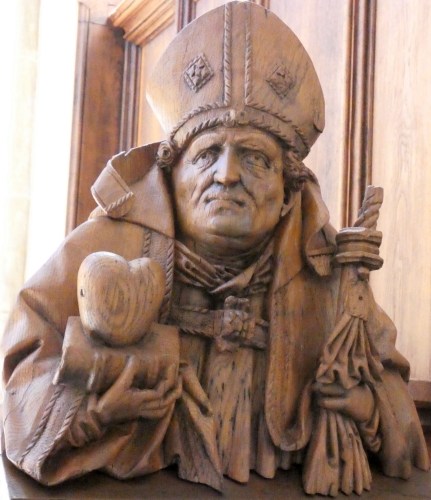 "Too late have I known Thee, too late have I loved Thee, beauty so ancient and so new! Too late have I loved thee!"
"Too late have I known Thee, too late have I loved Thee, beauty so ancient and so new! Too late have I loved thee!" "Too late have I known Thee, too late have I loved Thee, beauty so ancient and so new! Too late have I loved thee!"
"Too late have I known Thee, too late have I loved Thee, beauty so ancient and so new! Too late have I loved thee!"
Such was Augustine's cry when, far away from the busy town, the flattery of disciples, and the temptations of the Court, he grieved in secret over his past life. He was thirty-two, and had spent his life in sin. In childhood he had been proud and overbearing, willful and pleasure-loving; he had lied, cheated, and stolen. As he grew older the flattery of his companions, the indulgence of a pagan father, his own amazing progress in study, and the wicked example of his schoolfellows helped him on the downward road. "It is only shameful not to be shameless," he said of the inhabitants of Tegaste, the town of his birth. And he had been shameless for nigh on thirty years. But his mother's prayers and tears wrung, as it were, his conversion from Almighty God. "Go your way; God bless you; it cannot be that the child of those tears should perish," said a saintly Bishop to whom Monica, had gone in the anguish of her heart. But Augustine's struggle was severe and prolonged. He had so given way to all his evil passions that when at last he turned upon them as master, he found out how rebellious they were. Gluttony, intemperance, profanity, sloth, luxury - he had succumbed to all these and worse. For years he had lived an avowed Manichean, professing a heresy so disgraceful that only an intellect blinded by sin could fall a victim to it. But such an intellect was Augustine's. His depravity paved the way for this most grievous fall. By nature he was keen-witted, talented to an extraordinary degree, and singularly well instructed. Yet he fell as fall the blind - headlong. He taught heresy, defended it, and lived up to its code of ethics. But the day of grace came.
Once he heard the voice of a child say to him: "Tolle, lege! tolle, lege!" He took up the book before him and read it. It was an epistle of Saint Paul to the Romans. One sentence was enough. He closed the book and told his young friend, Alipius, that his resolution was taken. He would give up sin and turn to God. Together they went to Saint Monica and told her of their resolution. They would serve God henceforth as faithfully as before they had served their passions.
Then came that fearful fight. As a mature man, Augustine had to rise up and win a victory against terrible odds. But he did win it; one by one he crushed the evils within him, and never rested till his soul was as pure as a newly-baptized child's, and as strong as a saint's. By prayer and fasting and alms-deeds and austerities he drove out the demon, and continued for forty-four years in the practice of heroic virtue. His friend and counselor, Saint Ambrose, baptized him at Milan. After his mother's death he returned to Africa, was ordained priest, and subsequently consecrated Bishop of Hippo.
Augustine's life after his conversion was the exact opposite of what it had hitherto been. His earliest works were penned in refutation of the Manichean heresy. He preached with burning charity, often twice, always once, a day, and sought to save the souls of his flock with the zeal of an apostle. As before he loved applause, so now he sought for humiliations, and laid bare his heart with all its past sinfulness in a book called his "Confessions." This remains to us as a monument to his humility, the virtue most dear to the penitent saint. When asked for a sure road to wisdom, he answered, "Humility - this is in the first, the second, and the third place; and this would I answer as often as you ask me." He loved poverty, too, as a monk of the strictest order might. His clothes were decent, but barely so; no silver, spoons excepted, was ever used in his household; earthenware or wood was good enough for him. His food consisted of herbs and pulse, though meat was served to his guests. So much did he love charity that he was known to rise from table and retire if the reputation of an absent person was assailed, and he had a sentence written on the walls of his refectory warning all to be guarded in their speech. In his last illness, as in the first days of his conversion, he said the Psalms of David unceasingly, and had them written on tablets and hung up before him. During the last ten days of his life he separated himself from his dearest friends, and was occupied solely with God.
Augustine died in 430, in the seventy-sixth year of his age. Painters represent him with a burning heart as a symbol, because the strong love of his human heart was changed by grace and his own co-operation into a heart on fire with the love of God. "To whom much is forgiven, he loveth much."
- taken from Light from the Altar, edited by Father James J McGovern, 1906